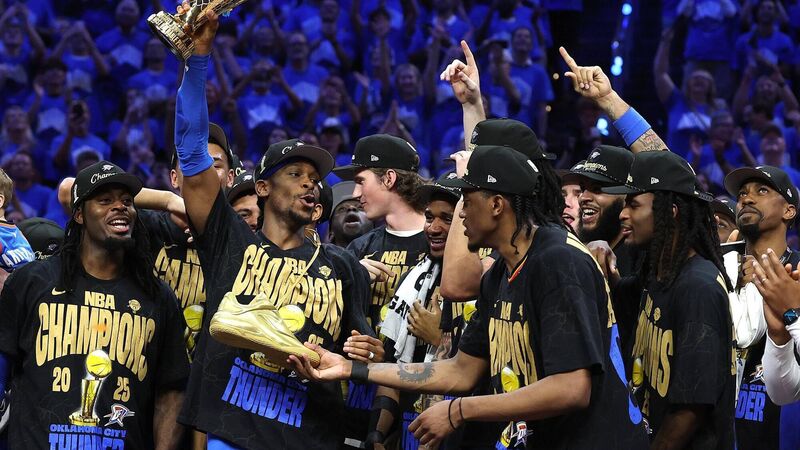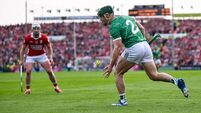Colin Sheridan: When sport becomes a market nobody plays for love anymore

MARKET PLACE: Once sport becomes a market place, nobody plays for the love of the sport anymore.
There’s a strange, hollow echo coming from the NBA this week - not the noise of a Spalding on hardwood, but the sound of a league choking on its own excess. Thirty-four people charged. Coaches, players, fixers, friends - all tangled in a web of illegal betting, insider information, and rigged poker games. Among them: Chauncey Billups, once a Finals MVP and now the Portland coach, and Terry Rozier, a Miami Heat guard on a contract worth over twenty million dollars a year.
Twenty. Million. Dollars. And yet here we are, reading about WhatsApp messages and burner accounts, about injuries faked not for recovery but for odds. You’d laugh, if it weren’t so depressing. Because the question lingers, uncomfortably: If a man earning $55k-a-days is willing to gamble - to risk not just money but career, reputation, legacy — then what chance does the apprentice plumber from Portlaoise have, earning €600 a week and marking an All-Star on a wet Sunday in February? The NBA’s latest scandal isn’t a sideshow; it’s a mirror. The league has spent the past decade not just tolerating gambling but courting it - partnering with sportsbooks, integrating live odds into broadcasts, turning every possession into a punter’s playground. Now, predictably, the casino’s spilled onto the court.
Federal prosecutors allege two main schemes: players leaking information about their performances to betting rings, and a separate network of high-stakes poker games linked to organised crime. It’s an unholy alliance of greed, ego, and access - a reminder that once money becomes the measure, integrity is optional. Commissioner Adam Silver, ever the diplomat, said the right words: “Nothing is more important than the integrity of the competition.” But in truth, the NBA sold that integrity years ago - sliced it into betting props and packaged it as “fan engagement.” Now, take a deep breath and picture something very different: a club game in west Clare. A few dozen locals on the sideline, a dog running loose, and a lad in corner-back who clocked off from a plumbing job at five to make a throw-in at half-six. He’s not getting paid. His gear bag smells like diesel and Deep Heat. His main motivation is pride - and maybe a feed of pints after. It’s easy to romanticise the GAA, to hold it up as the last parish standing in a world of corporate sport. But we’d be fools to think temptation stops at the Shannon. Gambling doesn’t respect amateurism. It doesn’t care whether you drive a Bentley or a battered Berlingo.
If men on NBA salaries can’t resist the lure of a quick score, then why wouldn’t a young inter-county player, juggling shift work and gym sessions, be tempted by the chance to make a few hundred quid on a sly wager? The difference, of course, is that the NBA has already turned the game into a marketplace. Every play is monetised. In contrast, the GAA still clings to an older idea: that sport’s value lies in participation, in the unprofitable beauty of competition itself. But that purity is fragile. You can feel the cracks forming - the creeping commercialism, the “player expenses,” the whispering about sponsorships that look suspiciously like salaries.
For now, the GAA survives on belief - that the amateur ethos protects it from the rot that seeps through professional sport. Yet belief alone isn’t insulation. The same phones that let NBA fans bet on Rozier’s next assist are sitting in Irish dressing rooms, too. The same dopamine, the same digital pull.
So if an NBA millionaire with accountants and agents and lawyers can’t resist, why should a 23-year-old apprentice from Offaly, training four nights a week for free, be expected to? That’s the uncomfortable truth. Money doesn’t corrupt; proximity to it does. It makes everything else feel cheap. And the modern sports landscape has never been so close, so visible, so seductive. Every GAA player scrolls through highlight reels of men being paid in minutes what they’ll never earn in a year. Every one of them is being told - by brands, by algorithms - that the game is currency.
The NBA’s descent is a cautionary tale. When you turn your sport into an investment vehicle, you invite investors. And investors don’t love - they leverage. The moment your performance is someone else’s bet, the purity is gone.
The GAA, in its stubborn way, still says no. No to salaries, no to transfer fees, no to naming rights on Croke Park (for now). It’s messy, yes. Hypocritical, sometimes. But it’s also sacred. Because once the money floods in, you don’t get it back out. And yet, the irony is brutal: the NBA’s multimillionaires and the GAA’s amateurs share the same human wiring. Temptation doesn’t discriminate. The only difference is scale - the NBA man risks millions; the GAA lad risks the trust of his community. Both pay dearly if caught.
The NBA’s scandal, then, isn’t a world away. It’s a warning shot. If players earning more in a week than a county board spends in a year can’t stay clean, then the idea that Irish amateurs will be immune is wishful thinking. So maybe it’s time for the GAA to talk about gambling - really talk. Not just token workshops, but honest conversations about pressure, temptation, the new online world that lives in every pocket.
Because someday soon, when a lad in Roscommon gets offered €500 to take an early black card, we’ll remember these NBA headlines and realise: it always starts with someone saying, “sure what harm?”
Somewhere in America tonight, a millionaire guard is wondering how he lost it all to a bet. Somewhere in Ireland, a young man is lacing his boots in the rain, dreaming of Croke Park. The trick - the real challenge - is keeping those two worlds apart.
Because once sport becomes a market, nobody plays for love anymore.
Those of us who have followed the career of Galway footballer Seán Kelly may have worried over the last couple of seasons that the weight of - well, pretty much everything - was beginning to take its toll. Injury. Expectation. Workload. Exhaustion. To see him play in high summer for Galway was recently to witness a diminished version of a player who’s trademark was that rarest of things - authentic leadership.
He could do everything - man-mark, sweep, field high ball, score points of either foot and - with one of his trademark bursts - find a goal from literally nothing. At 28, his form - through injury (and, I’m guessing, playing injured), had dipped to a point you’d worry would we ever see him at his swashbuckling best again.
On Saturday night in Pearse Stadium with a county final in the balance, Kelly dispensed with all the doubts. From his opening minute goal to his clutch score at the death and literally everything in between, he was imperious for a Maigh Cuillin side that looked inferior to Salthill-Knocknacarra on paper, but compensated with composure with the game mattered most.
For Salthill, Mattie Thompson and Rob Finnerty were a joy to watch, but it was Kelly who owned the night. There was a moment, with the game on the line, when he almost made time stand still. Fixing his marker like Steph Curry, he paused 60 yards from the Salthill goal. Everyone knew what was coming next, yet were unable to stop it. He stepped his man and drove into space, picking off a score with the instep of his weaker left foot. The intensity of his run back to midfield post-score was Roy Keane-like.
It was a study in authentic leadership, and a welcome reminder that this is a player whose best years are hopefully in his future and not his past.
Keith Andrews walks the touchline like a man forever re-interviewing for a job he already has. Every match feels like an audition, every win a plea to be taken seriously. Maybe it’s the Irish thing - that faint whiff of provisional acceptance - but it’s absurd, really.
His Brentford side are organised, brave, tactically literate, and punching well above their weight. Yet still, the whispering persists: is he really top-flight material?
Andrews doesn’t do swagger; he does substance. And substance, in football’s talent show economy, is the quietest virtue of all. But results - like Brentford’s thrilling victory over Liverpool on Saturday - are louder than reputations - and his keeps shouting.
The upcoming Kenny Dalglish documentary won’t just revisit a football life; it will serve as a reminder of one of the great British scandals of the last 50 years. Hillsborough was tragedy compounded repeatedly and deliberately by injustice - grief met with blame, pain met with lies. Dalglish stood in the rubble of that betrayal and did what leaders rarely do: he stood with people, not above them. The parallels with Bloody Sunday and the Soldier F verdict are too stark to ignore - different cities, same condescension from the powerful, same resilience from the powerless.
Sport woven into the fabric of ignored communities.. Dalglish’s greatness was never confined to Anfield; it was his decency, his defiance. A brilliant footballer, yes - but undeniably an even better man.



